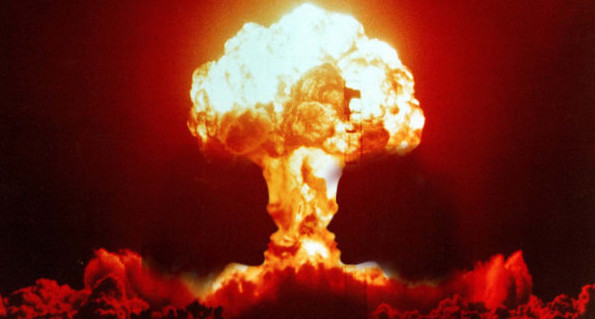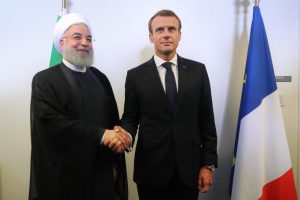by Derek Davison
With the rumored extension of the negotiations in Vienna on Iran’s nuclear program hanging in the air, a group of legislators and right-wing thinkers gathered on Capitol Hill yesterday to talk about what they believe a comprehensive deal with Iran should entail.
Senator Dan Coats (R-IN) told the assembled crowd that he was there to “ring the alarm” about the danger of a nuclear-armed Iran, and, indeed, that alarm rang over and over again throughout the event. The afternoon’s speakers were clear on one thing: nothing short of total Iranian capitulation would be an acceptable outcome to the talks, and even that would really only be acceptable if it came in the aftermath of regime change in Tehran. They were decidedly less clear as to how that outcome might be achieved.
The forum, “High Standards and High Stakes: Defining Terms of an Acceptable Iran Nuclear Deal,” was sponsored by the Foreign Policy Initiative (FPI) (successor to the now-defunct Project for the New American Century), the neoconservative Foundation for Defense of Democracies (FDD), and the Bipartisan Policy Center (BPC), which specializes in finding Democrats who agree with the neoconservative agenda when it comes to Iran. The speakers broadly agreed on the need to maintain and even increase sanctions to encourage the Iranians to negotiate, which seemingly ignores the fact that the Iranians are already negotiating and that the sanctions are in place precisely so that they can be traded away in exchange for Iranian concessions.
Among the materials distributed at the session was a paper by a group called the “Iran Task Force,” which has a few members in common with the “Iran Task Force” formed within the Jewish Institute for National Security Affairs but nonetheless seems to be a different group. The paper was titled, “Parameters of an Acceptable Agreement,” though it might better have been called “Parameters of a Deal That Would Certainly Be Rejected by Iran.”
The task force’s “acceptable agreement” requires, among other items, the complete dismantling of Iran’s enrichment capabilities and extraordinary monitoring requirements that would remain in place permanently. Again, this would not be a deal so much as it would be unconditional surrender by the Iranians, and would impose restrictions on Iran that even retired Israeli generals don’t seem to believe are necessary. If this is how the “Iran Task Force” defines an “acceptable agreement,” it seems fair to ask if they want any agreement at all.
One of the legislators who spoke at the forum was Brad Sherman (D-CA), who has endorsed the Iranian opposition group, the Mujahadeen-e Khalq, (aka MEK, MKO, PMOI and NCRI), which lobbied itself off the US terrorist organizations list in 2012 and whose desire for regime change is quite explicit.
Congressman Sherman offered some of the most colorful (or maybe “terrifying” is the better word) remarks. For example, he declared that Iran’s “breakout” period must be “years,” which would presumably involve subjecting all of Iran’s nuclear scientists to some kind of amnesia ray to make them unlearn what they already know about enriching uranium. He then argued that Iran’s ultimate goal was not a nuclear missile, but a device that could be smuggled into a major city and detonated without directly implicating Tehran. Most Iran hawks assume (based on questionable evidence) that Iran’s nuclear program is ipso facto a nuclear weapons program. But Sherman apparently also believes that in addition to craving a bomb, Iran wants to bring destruction upon the world. He closed by proposing that the United States arm Israel with advanced “bunker buster” bombs and surplus B-52 bombers, which would obviously ensure peace in that region.
After the legislators had their say, it was time for the expert panel, featuring FDD’s Reuel Marc Gerecht, Ray Takeyh from the Council on Foreign Relations, and Stephen Rademaker from the BPC. Gerecht argued that Iran has a “religious” need to acquire nuclear weapons, which might come as a shock to the Iranian religious establishment, and criticized the Obama administration’s unwillingness to apply “real” economic pressure to force Iranian concessions. He never got around to describing what “real” economic pressure looks like, or how much different it could be from what Iran is currently experiencing. It was also unclear why, if Iran does have such a strong need to develop a nuclear weapon, and if it hasn’t yet felt any “real” economic pressure, it agreed to, and has by all accounts complied with, the terms of the interim Joint Plan of Action reached in Geneva last year.
But it was Rademaker who came closest to openly admitting the theme that underpins the hawks’ entire approach to these talks: that no nuclear deal will ever be acceptable without regime change. He criticized last year’s historic deal for its promise that a comprehensive deal would remain in place for a specified, limited duration, and that Iran would be treated as any other Nuclear Non-Proliferation Treaty (NPT) signatory at the conclusion of the deal. Rademaker later compared Iran to Brazil and Argentina, whose nuclear programs were both abandoned after their military regimes gave way to democratic governments. At that point the suggestion that regime change, which didn’t exactly work out the way the US envisioned in Iran (1953) and Iraq (2003), must precede any normalization of Iran’s nuclear program was obvious.






How many of these people simply want to block any improvement in America’s relations with Iran, so long as Iran is not friendly toward Israel?
Perhaps these same people might form the Dr Stranglove Brigade, strap themselves onto the bombs that Israel/AIPAC wants the U.S. to use in the regime change end, starting with Cheney? That will show those Iranians they mean business. How about demanding Israel give up their Nuclear arsenal while their at it? Now that would be a real game changer, wouldn’t it? These people only seem to know one thing, “WAR”. I wonder what they’re going to say if/when the U.S. suffers another 9-11, especially if those bombs say “made in Dimona”.
These Chicken Littles have such a spotless record with their false alarm bells and predicting the future that we must keep listening to them, we must keep giving them an audience. They were so right with their past predictions, that if we don’t invade Vietnam WWIII will start, if we don’t invade Iraq in 1991 we’ll all be speaking Iraqese, if we don’t invade Iraq in 2003 the universe will explode, so now they’re at it again to save the world from their manufactured, delusionally infernal fantasies.
I would like them to explain one thing to me though. Here they are, dictating the criteria acceptable to them as far as how Iran must agree to dismantle everything and capitulate. But I thought Iran was not trustworthy, that Iran is not rational, that they are suicidal, that they can’t be negotiated with, that the only language they understand is a few nukes turning their cities into glass. So, why are they setting criteria? Those two ideas are in direct contradiction and completely incompatible. You can’t be right about both things. Are they admitting that they were completely wrong about rationality, language of force as the only viable option, suicidal nature of anyone with a muslim sounding name, etc.?
The genie is out of the bottle. It doesn’t take much to actually build a nuclear weapon, you just have to have the fuel, which in the case of these talks is the one key stumbling block. Khamenei has openly and forcefully spoken out in favor of expansion of its enriching capability and every Western nation at the table, including the Russians and Chinese are against it. So even though this article and others might try to couch this simply as a US vs. Iran debate, the truth of the matter is that the thought of Iran having expanded enrichment capacity pretty much scares of the tar out of everyone…if Putin can be scared of anything for that matter. So that bears some discussion as to WHY is everyone terrified of Iran having that capacity. That essential question is one that virtually all of the Iran supporters on here pretty much ignore. It’s also part and parcel the question as to why people seem to ignore Iran’s basic ignorance of human rights that virtually every other nation to some degree respects. With the exceptions often being totalitarian regimes.
So while human rights conditions were not an explicit component of these talks, they were the undeniable elephant in the room with negotiators because the basic logic stumping the West is how can we trust a regime that routinely hangs people, openly supports terrorist groups, publicly and annually demonstrates its jihad against the West and would like nothing better than wipe its rivals and enemies (Saudi Arabia and Israel) from the map.
That tends to give most rational people pause which is why even after a massive campaign of good cheer with Rouhani and Zarif and a blizzard of Instagram pics that would do any teenager proud, Western negotiators still balked even when they all really, really, really wanted to do a deal.
It demonstrates fully why the old axiom of not doing a deal at all instead of a dumb deal holds true here. So we’ll wait another few months and see if Iran is finally willing to swallow the pill of acting like a normal nation and reassure everyone it’s going to try and blow everyone up with a nuke.
To Karen: “Now, Now” let’s leave the name calling to change-“he/she/them”-! After all, “free speech is still on the books”, at least I think it is, and change-“he/she/them”-does “his/her/their” own position justice/injustice, with “his/her/their” prose. I’m of the opinion that if any article is written, no matter which country/peoples it’s about, that if “he/she/them” makes a comment, Iran will be to blame. Now, considering that “he/she/them” has used the same tactics/prose on almost everyone who comments here, who ever wrote “his/hers/theirs” program, is limited in its ability/content. “AS TO BEING A TROLL”, how can anyone with a straight face accuse “him/her/them” of being such, without also comparing “him/her/them” to the characters in that old movie “Weird Science”, where the two teenagers put their “underwear on their heads” while playing the “keyboard on the computer”? If nothing else, “he/she/them” deserves to be given a star for being consistent in delivering the same message with very little change, hence the name-change-in the authorship. I don’t know if this makes any difference in your understanding of “he/she/them”, “his/her/their” prose, but if you take every comment submitted by “him/her/them”, reduce it to its simplest form, It’s all Iran’s fault. Oh, I’m not sure if anyone else has noticed, but I don’t recall ever seeing any written critique of the “old Shaw of Iran” in the same sense that the present Leader[s] in Iran are? And yes, I misspelled the word shaw on purpose. I hope this helps you sleep a little sounder at night, knowing that you’re in excellent company in your view of change-“he/she/them”.